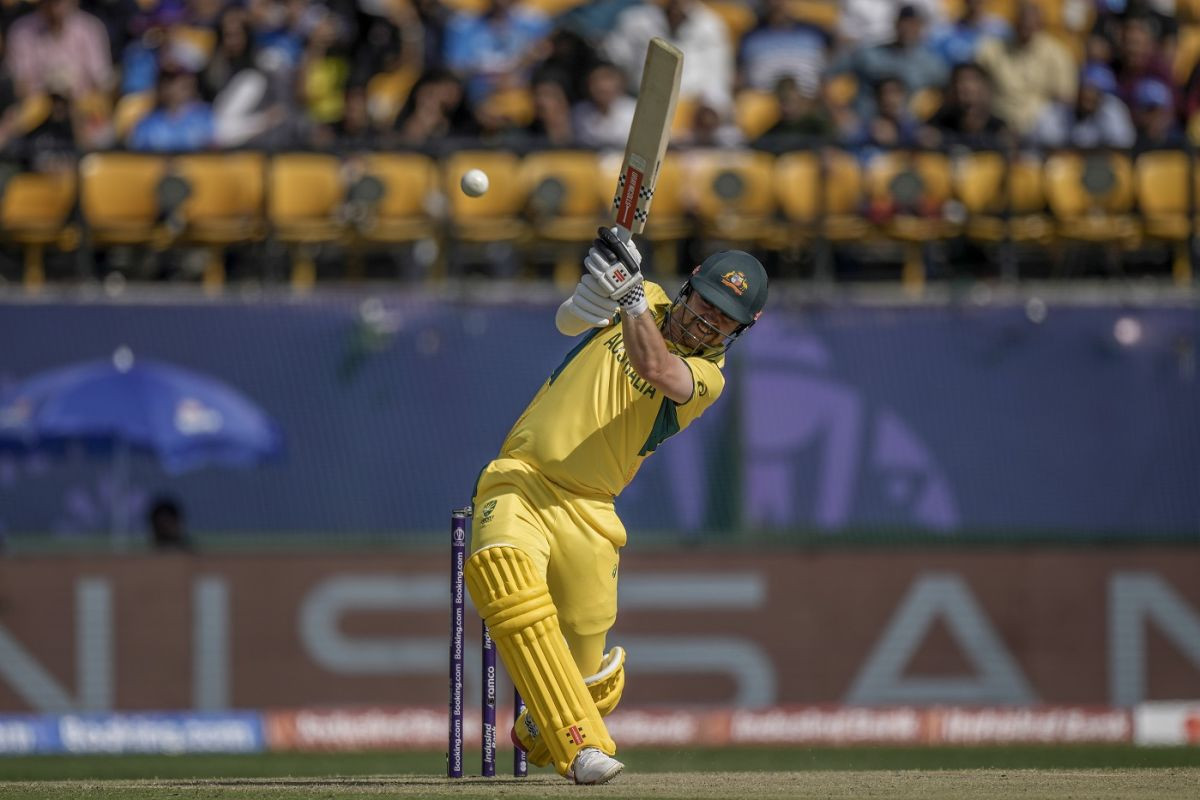Travis Head and Mitch Marsh have clubbed a world record T20 international powerplay score with a brutal display of hitting as Australia launched their white-ball UK tour by thrashing Scotland with more than half their overs to spare.
That enabled Australia to easily overhaul the target of 155 set by the hosts in the first of three T20s at the Grange in Edinburgh.
Australia's Powerplay Onslaught
The Australian onslaught began right from the start, with Head and Marsh showcasing their power-hitting prowess. They launched into the Scotland bowlers with a ruthless intent, smashing boundaries at will. The pair's partnership was a sight to behold, with Head and Marsh combining to score 113 runs in the powerplay - a new world record in T20Is.
Head was in a league of his own, scoring 73 runs off just 22 deliveries in the powerplay. He reached his half-century off just 17 balls, equalling Marcus Stoinis' Australian record for the fastest T20I fifty.
Marsh also contributed significantly to the record-breaking powerplay. He smashed 30 runs off one over from Jack Jarvis, highlighting his ability to clear the boundaries with ease.
A Clinical Bowling Performance by Australia
While Australia's batting performance was the highlight of the match, their bowling attack also deserves credit for restricting Scotland to a modest total of 154/9.
Sean Abbott was the pick of the Australian bowlers with 3/39. He was well supported by Xavier Bartlett who picked up 2/23 from his four overs.
Adam Zampa (2-33) and Riley Meredith (2-34) also delivered their full complement, while Cam Green (1-12) and Stoinis (0-10) shared a quota.
A Disappointing Performance by Scotland
Scotland's bowling attack was simply outclassed by the Australian batsmen. They were unable to contain the power hitting of Head and Marsh, and their fielding was also not up to par.
The Scottish bowlers were unable to find a way to break the Australian partnership, which eventually cost them the match.
A Look Ahead
This was the first of 11 matches on the tour with Australia subsequently facing England in three T20s and five ODIs. The series between Australia and Scotland is scheduled to continue on Friday, with the second T20I also taking place at the Grange in Edinburgh.
With Australia showing their strength in the powerplay, it will be interesting to see if they can maintain their momentum in the remaining matches of the tour. Scotland will be looking to bounce back from their disappointing performance and put up a better fight in the remaining matches of the series.
Records Tumble as Australia Dominates
The Australian victory over Scotland was a testament to their dominance in the shortest format of the game. The team's power hitting and clinical bowling performance left Scotland no chance to compete.
This match was not only a resounding victory for Australia but it also saw several records tumble.
Travis Head’s performance was one for the ages. He has established himself as one of the most devastating batsmen in T20 cricket. His ability to score runs at a rapid pace and his knack for hitting sixes has made him a valuable asset to the Australian team.
The record-breaking powerplay performance by Australia is a testament to their commitment to aggressive batting. The team has shown a willingness to take risks and to go for the big shots, and this approach has paid off handsomely.
A Moment of Controversy
While Australia's performance was the main talking point of the match, there was also a moment of controversy during the match.
Josh Inglis was given a dead ball after Mark Watt bowled a delivery from 25 yards. Inglis appeared to be ready and watching when Watt bowled. This decision was later clarified as correct by MCC. However, it did add a touch of drama to the match and highlighted the importance of every delivery in T20 cricket.
The Powerplay: A Crucial Phase in T20 Cricket
The powerplay is a crucial phase in T20 cricket. It is the time when the batsmen have the upper hand and can score runs freely.
This match was a perfect example of how important the powerplay can be. Australia’s powerplay performance set the tone for the entire match, and it was the difference between the two teams.
The powerplay is a period of high intensity, where both teams try to gain an advantage. It is a time when the batsmen try to score runs quickly and the bowlers try to contain them.
With field restrictions in place, the powerplay offers a valuable opportunity for batsmen to make the most of the field placements, and this is where the big hitters like Travis Head can truly shine.
Powerplay Kings: The Top 5 Performers
The powerplay has produced many memorable performances, and here are the top 5 performers in the history of T20I cricket:
-
Travis Head (Australia): Travis Head recently set a new record for the most runs scored in a T20I powerplay with his 73-run blitz against Scotland. This performance highlights his ability to dominate the powerplay phase.
-
Paul Stirling (Ireland): Stirling is known for his powerful hitting and has produced some memorable powerplay performances, including his 67 runs off 25 balls against the West Indies in 2020.
-
Colin Munro (New Zealand): Munro is a power-hitting specialist and is famous for his ability to clear the boundaries at will. His 66-run performance against the West Indies in 2018 is one of the most memorable powerplay performances in T20I history.
-
Quinton de Kock (South Africa): De Kock is a stylish batsman who is known for his explosive hitting. He has produced several notable powerplay performances, including his 64 runs off 24 deliveries against the West Indies in 2023.
-
Mohammad Rizwan (Pakistan): Pakistan's Mohammad Rizwan is an excellent powerplay batsman who can bat at any position and has produced several notable performances during this phase.
These players have all shown that they are masters of the powerplay. Their performances have inspired other players and have made the powerplay a crucial and entertaining part of T20I cricket.
The powerplay is an exciting phase in T20 cricket, and these players have all played a significant role in shaping the history of this format.


















